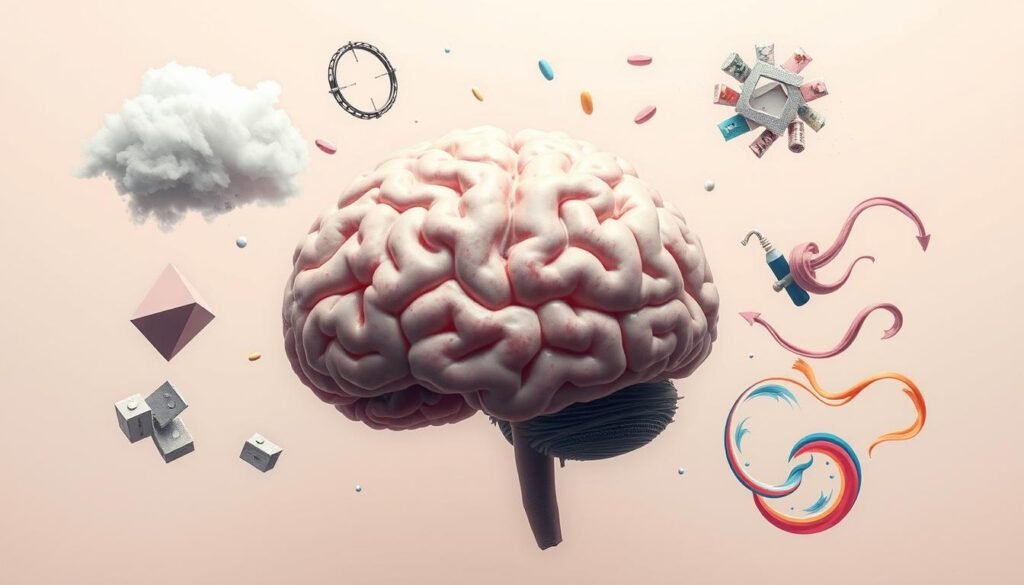About 32% of Americans will face an anxiety disorder in their lifetime. This fact shows the dire need for good anxiety treatments. Bupropion and selective serotonin reuptake inhibitors (SSRIs) are often chosen. Yet, debates about their success in treating anxiety are common. Around 60-85% of people find help with current treatments. However, only half fully recover. So, knowing how these antidepressants work for anxiety is key.
The way we treat anxiety is changing. It’s important for patients and doctors to know what choices they have. They especially need to understand bupropion versus SSRIs. This guide will help explain how these meds work. It will also discuss their benefits and how well they can help. This info aims to help those dealing with anxiety make smart health decisions.
Key Takeaways
- Around 32% of the U.S. population experiences anxiety disorders at some point in their lives.
- Bupropion and SSRIs are significant treatment options for managing anxiety.
- 60-85% of anxiety disorder patients see a positive response to current treatments.
- Understanding the differences between these medications can enhance treatment outcomes.
- Informed decision-making is vital for effective management of anxiety symptoms.
Understanding Anxiety Disorders
Anxiety disorders are crucial mental health issues that affect many people in the U.S. About 32% of people will face an anxiety disorder in their lives. Common forms include generalized anxiety disorder and social anxiety disorder, each with unique challenges.
Generalized anxiety disorder makes people worry too much about everyday things. This can mess up someone’s day-to-day life and lower their happiness. Social anxiety disorder makes people very afraid of being around others. They worry about being judged or feeling embarrassed. This fear can make them avoid social events, causing loneliness.
It’s essential to treat anxiety disorders. They can make other health problems worse and affect friendships and work. The increasing number of people with anxiety highlights the need for better treatments. Therapy, medicine, or changes in lifestyle can help improve well-being.
| Type of Anxiety Disorder | Key Features | Impact on Daily Life |
|---|---|---|
| Generalized Anxiety Disorder (GAD) | Excessive, uncontrollable worry | Disrupted daily functioning |
| Social Anxiety Disorder (SAD) | Fear of social evaluation | Avoidance of social situations |
| Other Anxiety Disorders | Includes panic disorder, OCD, etc. | Varied impacts depending on severity |
Current Pharmacological Treatments for Anxiety
Anxiety disorders are common, creating a demand for effective pharmacological interventions. There are many anxiety treatment options available. FDA-approved medications are at the forefront. Selective Serotonin Reuptake Inhibitors (SSRIs) like fluoxetine (Prozac), sertraline (Zoloft), and escitalopram (Lexapro) are widely used. They start working after 4 to 6 weeks. Many doctors prefer them for long-term use because they are safe.
Benzodiazepines such as Xanax, Klonopin, and Ativan offer quick relief. They can ease anxiety symptoms within 30 minutes to an hour. However, they can lead to dependence. So, they’re not great for long-term use. After 4 to 6 months, their effectiveness may decrease, which means doctors need to monitor patients closely.
Atypical antidepressants like bupropion are also used in treating anxiety. Bupropion is often chosen due to its effectiveness and fewer side effects of anxiety. It stands out as a good option for some people. For detailed info on these medicines, you can check out this page on anxiety medications.
Anxiety disorders sometimes happen along with other psychiatric conditions. This calls for personalized treatment plans. Every medication type has its benefits and possible side effects. Studies show that bupropion and SSRIs both do well, but how well varies by person. This highlights the importance of customized treatments.
The Role of Selective Serotonin Reuptake Inhibitors (SSRIs)
Selective serotonin reuptake inhibitors, or SSRIs, are key in treating anxiety. Doctors often prescribe SSRIs like paroxetine and escitalopram for anxiety. They’re known for being effective and safer than older drugs.
SSRIs boost serotonin in the brain, which helps manage mood. This action helps reduce symptoms of generalized anxiety disorder (GAD) and social anxiety disorder (SAD). Studies show that SSRIs efficacy really helps people with these conditions.
However, SSRIs may cause side effects. These include sleep issues, headaches, dizziness, and sexual problems. Nausea is also common, making it important to watch how patients react to the treatment. Those interested in learning about anti-anxiety medications can check out more information here.
It’s crucial to be careful when SSRIs are used with certain drugs, like monoamine oxidase inhibitors (MAOIs). This helps avoid serious issues like serotonin syndrome. Compared to older antidepressants, SSRIs are often chosen for their fewer side effects and lower overdose danger.
How Bupropion Works for Anxiety
Bupropion, also called Wellbutrin, is different in treating anxiety. Unlike common anxiety meds, it aims at norepinephrine and dopamine in the brain. Even though it’s not mainly for anxiety, new studies show it could be a good option.
Mechanism of Action
This drug works by stopping the reabsorption of norepinephrine and dopamine. This could mean fewer side effects like weight gain or sexual issues, often seen with SSRIs. Bupropion’s effects may take up to four weeks to be fully recognized.
Potential Benefits
The advantages of bupropion go past its impact on brain chemicals. Studies suggest it helps people with generalized anxiety disorder (GAD) who don’t get better with SSRIs. For example, a 2023 review found it as effective in easing anxiety as other antidepressants.
In people with major depressive disorder (MDD), bupropion helped keep anxiety levels from going up. It may even help lower anxiety overall.

If you’re looking into anxiety treatment options, bupropion might be worth considering. This is especially true if SSRIs haven’t worked for you. Always talk with your doctor about the pros and cons of bupropion and other meds.
Bupropion vs SSRIs for Anxiety: A Treatment Guide
It’s important to know how different medicines can help with anxiety. Bupropion, also known as Wellbutrin, offers an alternative to the usual SSRIs. Checking out a thorough medication comparison can give you key insights on how these drugs perform.
Efficacy of Bupropion
Bupropion has been getting a lot of focus lately for treating anxiety. It’s not your typical antidepressant. It works by affecting norepinephrine and dopamine in your brain. Studies are showing it can be just as good as SSRIs for easing anxiety symptoms. This makes bupropion a strong choice for those looking for something different.
SSRIs Efficacy in Treating Anxiety Symptoms
SSRIs are well-known for their success in treating various anxiety disorders. Drugs like escitalopram (Lexapro) have been very effective, according to clinical trials. But, how well they work can change from person to person. Things like your health history and other conditions you have play a part. This underlines the value of custom treatment plans and the role of doctors in choosing the best treatment.
Side Effects of Bupropion and SSRIs
When we talk about treating anxiety, it’s important to know the side effects of the meds. SSRIs and bupropion have their own side effects. People taking SSRIs often report some common problems. It’s key for patients to know about these issues to choose the best treatment.
Common Side Effects of SSRIs
SSRIs are widely used for anxiety and depression. The common side effects people report are:
- Headaches
- Nausea
- Insomnia
- Sexual dysfunction
Even though SSRIs are effective at easing anxiety, some stop using them because of the side effects. Knowing about SSRI side effects is vital for picking the safest meds. For more info, one can look into detailed research on this topic.
Bupropion Side Effects
Bupropion is an alternative that may not cause some common SSRI side effects. Still, bupropion side effects can happen. These include:
- Insomnia
- Dry mouth
- Increased anxiety
- Headaches
Healthcare providers monitor for safety, especially with bupropion’s rare but serious risks like seizures. Open talks about side effects improve treatment and help patients decide on their anxiety management. This approach ensures treatments are both effective and manageable.

| Medication Class | Common Side Effects |
|---|---|
| SSRIs | Headaches, Nausea, Insomnia, Sexual dysfunction |
| Bupropion | Insomnia, Dry mouth, Increased anxiety, Headaches |
Comparative Effectiveness of Bupropion and SSRIs
Understanding the effectiveness of bupropion versus SSRIs has become majorly important lately. Bupropion is used for depression and to help stop smoking. SSRIs, on the other hand, are often the first choice because they work well and have fewer side effects.
Results from Studies and Meta-analyses
Studies have shown interesting results about these antidepressants. SSRIs work faster, but bupropion catches up over time. This is especially true for certain groups of people. Meta-analyses results also show that different people react differently to these medicines. This shows that treatment should be customized.
Bupropion is special because it treats both depression and anxiety. It works by targeting dopamine and norepinephrine in the brain. SSRIs, however, focus on boosting serotonin to help with anxiety. Each has its own way of helping.
Here is a table comparing bupropion and SSRIs:
| Medication | Typical Onset of Action | Long-Term Efficacy | Common Side Effects |
|---|---|---|---|
| Bupropion | 1-4 weeks | Comparable to SSRIs | Dry mouth, insomnia, headache |
| SSRIs | 1-2 weeks | Well-documented efficacy | Nausea, drowsiness, sexual dysfunction |
In summary, the research highlights the importance of choosing the right treatment. Findings show that personalizing therapy choice between bupropion and SSRIs is key in managing anxiety.
Factors Influencing Medication Choice
Choosing the right medication for anxiety treatment differs from person to person. There are many things to consider, like patient history, other health issues, and how someone reacts to treatment. It’s key to understand these aspects to create a treatment plan that fits each person’s needs.
Patient History and Comorbid Conditions
A patient’s medical history is crucial in picking a medication. Things like gender, age, and any past drug abuse matter. Some specifics, like sleep troubles or relationship problems, can guide us to choose certain drugs like mirtazapine instead of sertraline. When a patient has other mental health issues, it makes choosing the right medicine even more complex.
Individual Response to Treatment
How patients respond to treatment can vary a lot. Some might do well with one medication, while others need different options. It’s important to keep an eye on how patients are doing, as changes might be needed. Factors like how severe the anxiety is, a person’s education, and their income can affect how well treatment works. This shows why treatments must be tailored to each individual for managing anxiety.
Alternative Anxiety Treatment Options
Exploring alternative treatments for anxiety is very important. It helps people with different needs. Using drugs like SSRIs and bupropion is common. But, having more ways to manage anxiety can make treatments work better.
Psychological Therapies
Psychological therapies are key in managing anxiety. Cognitive behavioral therapy (CBT) is very effective. It helps people change negative thoughts that cause anxiety. CBT teaches people how to cope better with their feelings. Exposure therapy helps people face what scares them in a safe way. This shows how strong psychological methods are by themselves or with other treatments.
Other Medications and Approaches
Besides talking therapies, there are other medicines for anxiety. Buspirone is one, and it’s good because it doesn’t cause addiction. But benzodiazepines, which work quickly, can be addictive. Practices like mindfulness and yoga also help. Along with changes in how you live, they fight anxiety. So, using these methods together can create a complete plan that meets personal needs.
Future Directions in Anxiety Treatment
Emerging research sheds light on new ways to treat anxiety. It brings hope for treatments that are more effective and suited to the individual. By looking into how our brains work, scientists are finding new drugs and methods. They aim to better support patients who face ongoing challenges with anxiety.
Emerging Research on New Medications
Recently, experts have pointed out the need to look beyond usual anxiety drugs. This is because a significant number of patients don’t fully recover using current medicines. Research is now looking at drugs like Wellbutrin. This drug works on different brain chemicals and might help those with generalized anxiety disorder (GAD) who haven’t found relief elsewhere. Studies are also exploring drugs called SNRIs, like venlafaxine. These could offer a new path for treating various anxiety conditions more effectively.
Innovative Therapeutic Strategies
The way we tackle anxiety is changing thanks to new strategies. Techniques like Transcranial Magnetic Stimulation (TMS) offer great promise. They are not invasive and can be a game-changer for treatment. Adding mobile health tech into the mix can also make a big difference. It keeps patients connected, offering immediate feedback to doctors. This can lead to quicker adjustments in treatment and better outcomes. These advances signal a bold move towards meeting the intricate needs of anxiety sufferers.

Conclusion
Understanding the differences between bupropion and SSRIs is key in managing anxiety. Bupropion and SSRIs have been found similarly effective for anxious depression. This is especially true for patients with major depressive disorder. Studies with thousands of patients show both treatments have comparable results over time. This highlights the importance of making informed decisions in patient care.
Healthcare providers need to tailor treatment plans for each patient’s unique needs. They should weigh bupropion’s benefits, like fewer side effects regarding weight, sexual health, and sleepiness, against SSRIs. For those particularly impacted by these side effects, bupropion could be a better choice for managing anxiety.
New research keeps improving our understanding of these medications’ effects. Such studies also compare bupropion to SSRIs in terms of effectiveness. This allows doctors to improve how they prescribe treatments. By using research-based evidence, they can achieve better results for patients. It paves the way for personalized anxiety treatment. To learn more about bupropion as a top antidepressant choice, check out this source.